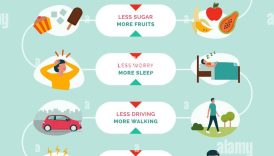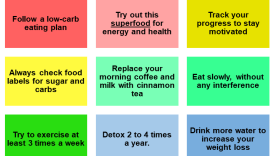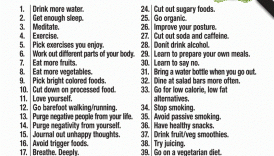The Ultimate Guide to Maintaining a Healthy Lifestyle for Life

Introduction to Maintaining a Healthy Lifestyle
Importance of a Healthy Lifestyle
Maintaining a healthy lifestyle is crucial not only for physical well-being but also for mental and emotional health. Imagine waking up each day feeling energized and ready to tackle whatever life throws your way. A healthy lifestyle can make this a reality. It encompasses balanced nutrition, regular physical activity, and adequate rest. When individuals actively prioritize their health through these means, they benefit significantly. From reducing the risk of chronic diseases such as diabetes and heart disease to improving academic performance and workplace productivity, the importance of a healthy lifestyle cannot be overstated. Adopting healthy habits ultimately creates a foundation for a happier and more fulfilling life. Here are some key points to consider about the importance of a healthy lifestyle:
- The Ultimate Guide to Maintaining a Healthy Lifestyle for Life
- Introduction to Maintaining a Healthy Lifestyle
- Importance of a Healthy Lifestyle
- Benefits of Long-Term Health
- Nutrition and Diet
- Building a Balanced Diet
- Superfoods for Optimal Health
- Regular Physical Activity
- Different Types of Exercises
- Creating a Fitness Routine
- Mental Health and Well-Being
- Stress Management Strategies
- Importance of Sleep
- Hydration and Water Intake
- Benefits of Staying Hydrated
- Tips for Increasing Water Consumption
- Prevention of Disease: A well-rounded approach to health can significantly lower the risk of long-term ailments.
- Enhanced Mood: Engaging in regular physical activity is a proven way to lift your spirits and reduce feelings of anxiety.
- Increased Longevity: Individuals who maintain healthy habits tend to live longer, more quality-filled lives.
Benefits of Long-Term Health
The benefits of prioritizing long-term health extend beyond just living longer; it’s about living better. For instance, many people often share stories about their experiences of making healthier choices and the remarkable differences they observe. Take Sarah, for example, who decided to swap her fast-food lunches for wholesome salads. Over time, she noticed not just improved physical health but also a boost in her confidence levels. Here are some notable benefits of long-term health:
- Sustained Energy Levels: A balanced lifestyle leads to improved fitness and better energy management throughout the day.
- Improved Mental Clarity: Regular exercise and proper nutrition can enhance cognitive function, promoting clearer thinking and better decision-making.
- Stronger Immune System: A focus on health minimizes the chances of falling ill, ensuring a more active lifestyle.
In short, committing to maintaining a healthy lifestyle is an investment in oneself that yields abundant returns, both in the present and in the future. When individuals take charge of their health, they unlock the potential to live a vibrant, fulfilling life.
Nutrition and Diet
Building a Balanced Diet
Transitioning into a healthy lifestyle naturally leads to conversations about nutrition and diet. Building a balanced diet is one of the fundamental pillars of healthy living. It’s amazing how making conscious choices about what we eat can dramatically improve our overall well-being. A balanced diet includes a variety of food groups that provide essential nutrients. This means incorporating fruits, vegetables, whole grains, lean proteins, and healthy fats into daily meals. For instance, when John, a busy professional, started prepping his meals at the beginning of each week, he found it easier to choose nutritious options that fueled his body. Here’s a simple way to think about a balanced plate:
- Fruits and Vegetables: Half of your plate should consist of colorful fruits and vegetables to ensure a range of vitamins and minerals.
- Whole Grains: Opt for whole grains like quinoa, brown rice, and whole-wheat bread, which provide energy and fiber.
- Lean Proteins: Options like chicken, fish, tofu, and legumes are great sources of essential protein.
- Healthy Fats: Incorporate foods like avocados, nuts, and olive oil to support heart health.
Superfoods for Optimal Health
Incorporating superfoods into your diet can further enhance the nutritional value of your meals. Superfoods are nutrient-rich foods that provide significant health benefits. They are often packed with antioxidants, vitamins, and minerals that play a role in preventing diseases. Some top superfoods to consider:
- Berries: Blueberries, strawberries, and acai berries are loaded with antioxidants that can boost heart health and improve cognitive function.
- Kale: This leafy green is a powerhouse of vitamins A, C, and K, along with fiber that aids digestion.
- Quinoa: Often deemed a complete protein, quinoa contains all nine essential amino acids, making it an excellent choice for vegetarians and vegans.
- Chia Seeds: These tiny seeds are high in omega-3 fatty acids, fiber, and protein, supporting heart health and digestion.
By including a variety of these superfoods in everyday meals, individuals can take significant strides toward achieving optimal health. In the journey of maintaining a healthy lifestyle, focusing on both a balanced diet and incorporating nutrient-dense superfoods can lead to a fulfilling and energized life.
Regular Physical Activity
Different Types of Exercises
After emphasizing the importance of nutrition and diet, it’s time to dive into another essential aspect of maintaining a healthy lifestyle: regular physical activity. Engaging in various types of exercises not only supports physical health but also contributes positively to mental well-being. It’s fascinating how diverse physical activity can be. From low-impact exercises suitable for beginners to high-intensity workouts for seasoned athletes, there’s something for everyone. Here’s a rundown of different types of exercises one might consider:
- Cardiovascular (Aerobic) Exercises: Activities such as running, cycling, swimming, and dancing get your heart pumping and improve cardiovascular health.
- Strength Training: Using weights or resistance bands to build and maintain muscle mass, such as in weightlifting, bodyweight exercises (like push-ups and squats), or yoga.
- Flexibility and Balance: Practices like yoga and Pilates enhance flexibility, core strength, and balance, promoting overall stability and reducing injury risks.
- Recreational Activities: Engaging in fun activities like hiking, playing sports, or even taking a dance class can make exercise feel less like a chore.
When Sarah began exploring various exercise options, she found joy in taking Zumba classes, allowing fitness to feel more playful than tedious.
Creating a Fitness Routine
Once individuals identify the types of exercises they enjoy, the next step is to create a sustainable fitness routine. A structured routine can greatly enhance consistency and make workouts more enjoyable. Here’s how to develop an effective fitness plan:
- Set Realistic Goals: Start with achievable goals, whether it’s exercising three times a week or running a certain distance. For example, setting a goal to walk 10,000 steps per day can be a great starting point.
- Mix It Up: Incorporate a blend of cardio, strength training, and flexibility exercises to keep workouts engaging.
- Schedule Workouts: Treat workout sessions like important appointments. Insert them into your calendar and commit to them!
- Listen to Your Body: It’s essential to pay attention to how your body feels. If you need rest, don’t hesitate to take a break.
- Track Progress: Keeping a journal or using an app to record workouts can provide motivation and help track improvements over time.
By establishing a regular fitness routine, individuals can reap the plethora of benefits that come from being physically active, reinforcing the commitment to maintaining a healthy lifestyle.
Mental Health and Well-Being
Stress Management Strategies
Shifting our focus from physical activity, we delve into a crucial yet often overlooked aspect of maintaining a healthy lifestyle: mental health and well-being. One of the primary challenges many face today is managing stress. It’s a common thread woven into the fabric of daily life, but how we handle it makes all the difference. Personal experiences often highlight effective stress management strategies. For instance, Lisa, a college student juggling classes and a part-time job, discovered the significance of mindfulness meditation. By setting aside just 10 minutes each day to focus on her breath and clear her mind, she found that her stress levels significantly decreased. Here are some strategies that can be beneficial:
- Mindfulness and Meditation: Practicing mindfulness encourages being present and reduces anxious thoughts.
- Regular Exercise: Physical activity can serve as a natural stress reliever by releasing endorphins, which improve mood.
- Deep Breathing Exercises: Taking a few minutes to practice deep breathing can lower tension and promote relaxation.
- Time Management: Organizing tasks through to-do lists or planners helps reduce feelings of being overwhelmed.
- Social Support: Connecting with friends and family can provide comfort and perspective during stressful times.
Importance of Sleep
Another vital component of mental health is quality sleep. Without adequate rest, managing stress becomes considerably more challenging. Sleep plays a pivotal role in emotional regulation, cognitive function, and overall well-being. Many might recall mornings after a restless night; it’s no surprise that the day feels more daunting. Here are some key points highlighting the importance of sleep:
- Better Mood: Consistent quality sleep contributes to emotional stability, making it easier to handle stressors.
- Cognitive Function: Adequate rest enhances memory, decision-making, and problem-solving abilities.
- Physical Health: Sleep deprivation is linked to various health issues, including weakened immune function and weight gain.
To cultivate better sleep habits, consider the following tips:
- Establish a Sleep Routine: Go to bed and wake up at the same time daily to regulate your body’s internal clock.
- Create a Relaxing Environment: Make your bedroom a sanctuary. Dim the lights, reduce noise, and ensure a comfortable temperature.
- Limit Screen Time: Reduce exposure to screens at least an hour before bed to support melatonin production.
By proactively managing stress and prioritizing sleep, individuals can greatly enhance their mental health and well-being, which is a crucial part of a balanced healthy lifestyle.
Hydration and Water Intake
Benefits of Staying Hydrated
Having explored mental health and its importance, it’s time to shift our focus to an equally crucial aspect of maintaining a healthy lifestyle: hydration and water intake. An often underestimated element, staying well-hydrated offers numerous benefits that can transform one’s daily life. Consider the feeling of clarity that washes over you after a refreshing glass of water on a hot day. This simple act can make a substantial difference! Hydration plays a key role in countless bodily functions, including:
- Regulating Body Temperature: Adequate water intake helps maintain a normal body temperature, especially during physical activities and hot weather.
- Supporting Digestion: Water is essential for digestion and nutrient absorption, preventing issues like constipation.
- Improving Skin Health: Well-hydrated skin looks healthier, with improved elasticity and fewer wrinkles.
- Boosting Energy Levels: Dehydration can lead to fatigue; even mild dehydration may cause feelings of tiredness or sluggishness.
- Enhancing Mental Performance: Studies have shown that proper hydration can improve concentration, mood, and cognitive functioning.
To illustrate, when Jake, a busy office worker, started focusing on his hydration, he quickly noticed how energized he felt throughout the day and how much sharper he became in meetings.
Tips for Increasing Water Consumption
Now that we understand the significance of staying hydrated, here are some practical tips to help increase water consumption:
- Carry a Water Bottle: Having a reusable water bottle at your desk or in your bag serves as a constant reminder to drink water. Aim to refill it several times a day!
- Set Reminders: Use smartphone apps or alarms to remind you to drink water at regular intervals. Seeing notifications encourages you to sip more often.
- Infuse Water: Add slices of fruits, herbs, or vegetables (like lemon, cucumber, or mint) to your water for a refreshing twist that makes drinking water more enjoyable.
- Track Your Intake: Keep a daily log of your water consumption. Some apps even allow you to monitor and set goals.
- Incorporate Foods with High Water Content: Include fruits and veggies like watermelon, oranges, cucumbers, and spinach in your diet, which can contribute to overall hydration.
By being proactive about hydration, individuals can experience a notable enhancement in their overall health and energy levels. Staying hydrated is a simple yet powerful commitment to supporting both physical and mental well-being, rounding out the foundation of a healthy lifestyle.





